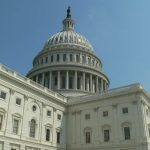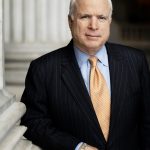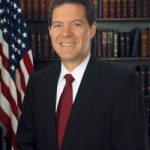Verizon: Current telecom law is 'irrelevant' to the modern Internet

"Thanks to the efforts of the Federal Communications Commission, we now have a National Broadband Plan, which lays out a vision for a vibrant broadband and Internet marketplace," began Verizon Executive Vice President for Public Affairs Tom Tauke, in a speech to the Washington think tank New Democrat Network yesterday. But that's where the perfunctory appreciation stopped: "In my view, the current statute is badly out of date. Now is the time to focus on updating the law affecting the Internet. To fulfill broadband's potential it's time for Congress to take a fresh look at our nation's communications policy framework."
It was an important speech not only for who was speaking, but where it was spoken: NDN is perhaps the furthest thing from a libertarian free-enterprise institute. It's a group of active Democrats who are celebrating the passage of step one of health care reform, and who believe that federal policy reform can reset and reinvigorate the public agenda, on issues including broadband buildout and human rights. Verizon cozying up to NDN would be like allying itself with Google...but then again, it has allied itself with Google.
First signs of Broadband Plan scale-back include subtle dig at FCC predecessor

The need for an American national broadband deployment plan, focused at the time on extending broadband access to rural areas, was not initiated by current Federal Communications Commission Commissioner Julius Genachowski. It was proposed last May by his immediate predecessor, then-Acting Chariman Michael Copps, who remains a commissioner today. Copps' proposition likened the deployment of a national broadband strategy to the historically successful construction of the interstate highway system -- Pres. Dwight D. Eisenhower's crowning achievement after D-Day (PDF available here).
Comm. Copps invoked that analogy in order to emphasize not only the tremendous public works effort that would be required, in his view, to deploy truly fast broadband Internet service cross-country, but also a massive public/private partnership that relied on corporate investment, and faith in an eventual supreme payoff for all of American industry.
Netflix to FCC: NBCU + Comcast could bypass net neutrality

In a world where Federal Communications Commission Chairman Julius Genachowski's six principles for net neutrality are enforced, everyone who makes a living on the Internet could conceivably be "unburdened by the unnecessary intervention of network operators or government regulators." The exception would be when a pipeline provider such as Comcast merges with a content provider such as NBC Universal, to make certain classes of content viewable online only when it designates. That's the opinion of attorneys for video rental service Netflix, in a filing last month with the FCC and recently made public.
"Netflix believes that the codification of the existing network neutrality principles, together with the addition of nondiscrimination and transparency, create an effective framework for preserving an open Internet," begins Netflix' filing, written last January 14 (PDF available here). "These rules will allow all parts of the industry -- network operators, consumer electronics manufacturers, and edge providers of content, applications, and services -- to continue to innovate at a rapid pace, unburdened by the unnecessary intervention of network operators or government regulators."
Net neutrality objections fade, Congress appears likely to pass NBCU + Comcast

In the end, it was one lone congressman who raised the subject of net neutrality, with respect to access to content over the Internet, as more than a passing reference, or by way of suggesting that certain topics be ignored altogether: Rep. Ed Markey (D - Mass., who also chairs the Energy and Environment Subcommittee), author of the Internet Freedom Preservation Act still being deliberated in Congress, voiced his skepticism over the viability of the proposed acquisition of NBC Universal by a new unit of Comcast, saying he didn't see any guarantees that the current class of over-the-air programming offered by NBC would not be transferred to Comcast pay-TV services such as TV Everywhere.
But with NBC being the butt end of jokes on TV everywhere, and elsewhere, with respect to its dismal standing in audience ratings and its poor handling of the recent "Tonight Show" reprogramming kerfuffle, the objections raised by Rep. Markey might not have mattered much. In some folks' mind, why would anyone want to pay for NBC shows anyway?
Comcast may get legal leverage to stop net neutrality enforcement

According to multiple eyewitness reports Friday, including from the Associated Press and from participants in the hearings, a three-judge panel of the US Court of Appeals for the DC Circuit in Washington yesterday, hearing oral arguments in the Comcast v. FCC case challenging possible net neutrality regulation, appeared skeptical of the FCC's authority to enforce such regulation based on a policy statement, rather than law.
At issue in this landmark case is whether the US Federal Communications Commission has the authority under law to force Comcast not to implement per-application throttling techniques in the name of network management -- for instance, slowing down BitTorrent traffic. Back in August 2008, the FCC found Comcast in violation of rules, and ordered the company to cease any network management practice that discriminated against lawful services that customers could use for lawful purposes.
Is the Internet full? AT&T's dire warnings sound a too-familiar theme

In public policy, there's a concept known as the "Statue of Liberty ploy" (not to be confused with the Statue of Liberty play): Faced with any sort of budget cuts in a given area, officials say sorrowfully that they will be forced to shut down the Statue of Liberty, counting on the huge public outcry that ensues to restore funding.
We're seeing that now from AT&T, in its efforts to influence public policy.
First was its performance with the FCC at the end of the year, saying that in order to provide broadband access to everyone in the US, it would be forced to shut down the landline telephone network, regardless of the fact that millions of people still use it. We saw something similar in early December, where AT&T said that, due to its pesky iPhone users being so greedy, it would be forced to implement usage-based pricing if they didn't pace themselves.
Do ISPs have First Amendment rights? Net neutrality vs. VoIP connectivity

As the US Federal Communications Commission continues to consider regulations that would limit an Internet service provider's ability to restrict customers' access to specific services in the name of traffic management, it is now no longer possible to foresee an outcome to the debate without someone claiming that constitutional rights are being violated somewhere.
"It should not be lost on anyone that the strongest and loudest voices for net neutrality rules often cloak their agenda as advancing the First Amendment or, just as frequently, First Amendment 'values,'" stated National Cable & Telecommunications Association President Kyle McSlarrow, in a speech last week to The Media Institute in Washington. "But urging the government to impose rules that supposedly promote First Amendment values is too often used to justify regulations that instead threaten First Amendment rights. By its plain terms and history, the First Amendment is a limitation on government power, not an empowerment of government. Making these arguments is, ironically, almost proof that First Amendment rights are being implicated."
The wireless data paradox: AT&T asks you to use less data

So let me get this straight: AT&T says iPhone users are using too much data. And to ease the resulting strain on its network, the carrier wants to...(ahem)...encourage its customers to throttle back on YouTube, live-streamed radio, and other media-rich apps. A week after playing the good guy with "Mark the Spot," a handy iPhone app that lets users report on coverage dead zones, AT&T is reversing any goodwill gained by warning heavy users they may soon face extra charges for their data gluttony.
Someone please tell me this is little more than a badly thought-out joke.
McCain's 'Real Stimulus' to go head-to-head against FCC's 'net neutrality'

The day after the US Federal Communications Commission voted unanimously to begin debate on the possible introduction of new federal regulations governing how Internet service providers may delineate and manage services for their customers, Sen. John McCain (R - Ariz.) announced he will be proposing simple and swift legislation that would forever separate the Internet from the FCC's purview.
Sen. McCain's office presented Betanews with the very latest draft of the bill this afternoon, which has yet to be reported to the floor (thus it does not yet have a number), and has within the last few hours been renamed the "Real Stimulus Act of 2009." Its earlier name, the "Internet Freedom Act," clashed too strongly with competing pro-net-neutrality legislation introduced earlier this year in the House. As it stands now, it's only a two-page bill, the principle clause of which reads: "The Federal Communications Commission shall not propose, promulgate, or issue any regulations regarding the Internet or IP-enabled services." Exceptions would be in cases of national security, to ensure public safety, or to aid in law enforcement activities; and existing regulations to that effect would still be considered in effect.
Dual Verizon CEOs deftly dance on both sides of net neutrality

At about the same time Verizon Wireless CEO Lowell McAdam was preparing to issue a joint statement with Google, of all companies, signaling his company's support of the FCC at least opening up the floor to debate on proposed net neutrality legislation, Ivan Seidenberg, the CEO of parent company Verizon Communications, told attendees at the Supercomm conference in Chicago (as covered by CNET's Marguerite Reardon) that regulating net neutrality itself is "a mistake."
While bloggers noticing McAdam's signature alongside that of Google CEO Eric Schmidt took it to mean that Verizon had actually switched sides on the issue (again, folks, it's a good idea to read the whole story), it's clear that the intent of the joint statement was to demonstrate the company's willingness to come to the table and debate the issue civilly, and to listen to Google's side of the argument as well. But McAdam's fingerprints were all over sentence #2, which acknowledges that his company still disputes "whether mobile networks should even be part of the discussion" -- in other words, whether the FCC has the right to use net neutrality as a springboard for regulating Internet commerce and transactions.
Apple's lack of iPhone tethering: Can 'net neutrality' render it illegal?

The principal argument made by opponents of "net neutrality" regulation, such as what the US Federal Communications Commission formally proposed today, is that government need not extend the hand of regulation to an industry that has arguably flourished in the absence of regulation. Almost like a Microsoft "embrace and extend" policy, opponents argue, government can conceivably leverage its advantages on one platform to extend itself to another, as FCC Chairman Julius Genachowski has actually admitted he's doing with respect to using telecommunications law to regulate Internet service -- an area that was, up until 2004, outside the FCC's purview.
The year 2004 is when then-Chairman Michael Powell put forth his "Four Freedoms" for Internet users which, though not actually law, were certainly cited by legislators in pushing net neutrality legislation (none of which actually passed). The third freedom, as Powell put it then, was this: "Consumers should be permitted to attach any devices they choose to the connection in their homes." Today's FCC refers to this as the "any-device rule."
FCC advances net neutrality rules for wireless carriers

Today, the Federal Communications Commission moved forward with the hotly debated Net Neutrality policy revision, and opened the floor for public comment on the updated framework for a "free and open Internet" based on the "Four Freedoms" laid down in 2005 by former FCC Commissioner Michael Powell.
"The goal is and must remain without compromise preserving a free and open Internet," Commissioner Julius Genachowski said this morning. "Any rules we adopt must preserve our freedom to connect, to communicate, and to create that is the wonder of the open Internet. Each and every user of the Internet must have access to an unlimited online universe of ideas and commerce. Internet users should always have the final say about their online experience, whether it's the software, applications or services they choose, or the networks and hardware they use to connect to the Internet."
Senate GOP: FCC's net neutrality 'will limit the freedom of the Internet'

Using the strongest language to date in firing a shot across the bow against unchallenged regulation of the broadband access market, a group of 18 Senate Republicans led by Sam Brownback (R - Kan.) sent Federal Communications Commission Chairman Julius Genachowski a letter yesterday, signaling their intention to oppose any efforts by the FCC to create new restrictions on broadband Internet access suppliers, without clear case studies proving such restrictions are necessary.
"We fear that the proposals you announced during your September 21, 2009 speech will be counterproductive," wrote Brownback and his colleagues, "and risk harming the great advancements in broadband speed and deployment that we have witnessed in recent years, and will limit the freedom of the Internet." (PDF available here, from the Washington Post.)
FCC chair lays down groundwork for net neutrality rules

At the Brookings Institution in Washington, DC today, Federal Communications Commission chairman Julius Genachowski discussed the Commission's plans for preserving net neutrality with the addition of two new tenets to the FCC's existing open Internet principles.
"Why has the Internet proved to be such a powerful engine for creativity, innovation, and economic growth?" Genachowski asked, "A big part of the answer traces back to one key decision by the Internet's original architects: to make the Internet an open system."
New FCC chief draws a line in the sand on net neutrality

On the eve of easily the most important Federal Communications Commission open hearing since being sworn in as its chairman, Julius Genachowski is taking the strong personal stand he was expected to take, in favor of equal and open access to Internet services. Returning to the heart of the original debate from which the term "net neutrality" was coined, Genachowski told the Capitol Hill daily The Hill yesterday that he remains committed to enforcing net neutrality principles, assuming they actually become law.
"One thing I would say so that there is no confusion out there is that this FCC will support net neutrality and will enforce any violation of net neutrality principles," the FCC Chairman told The Hill.
Recent Headlines
Most Commented Stories
BetaNews, your source for breaking tech news, reviews, and in-depth reporting since 1998.
Regional iGaming Content
© 1998-2025 BetaNews, Inc. All Rights Reserved. About Us - Privacy Policy - Cookie Policy - Sitemap.